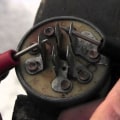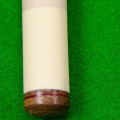Ideally, you should get a cue that weighs 18.5-21 ounces for American pool and one that weighs 17-19 ounces for snooker. For your main game cue, use the weight that is most comfortable for you. The most important tip regarding options for touching the weight of the cue and the hardness of the tip is to choose something with a stick. For more information, see Selecting a Signal.
How heavy should my pool cue be? pool sticks (or pool cues) are usually 19 or 20 ounces. This weight range will work for most people and “house cues” in bars or pool halls generally weigh 19 ounces or 20 ounces. Most beginners to the game of billiards use bar and pool hall sticks instead of investing in a personal cue. When you are just learning to play, the stick is less important than developing a soft stroke and careful aiming.
The club will not play the game; the player will imbue the cue with his own talent and abilities. And, as you develop your game, you'll have a better idea of what you want and need in your personal signal. A warning about it; make sure that the cue you use is straight and has a good tip; the best players will be thrown out by a distorted cue. Graphite Fiberglass Billiard Cue & View All Pool Table Accessories For example, a heavier billiard stick weight will make your shot out of center even more, and you will find it harder to keep the line as you wanted.
A lighter pool stick weight will glide better, shaking less out of line due to friction through the guide hand. You'll also need less force to move a lighter cue, allowing you to be more refined with your shots. What else do you need to know about your ideal pool cue? Ask us. Return in original condition, read our policies.
His first introduction to the weight of the pool cue was most likely when he took a look at the small numbers on a home cue in a pool hall or bar. The weights of tacos de casa generally range from 19 to 20 ounces. Standard billiard cue weight ranges, as per manufacturers' specifications, range from 18 to 21 ounces, with half-ounce intervals in between. That said, the most common weight for a pool cue of any type is 19 oz.
The vast majority of tacos we sell are 19 oz tacos. Anecdotal theories about the weight of the taco abound, but to date I have not seen any research that supports these theories. Some people hold the belief that a heavier signal will equal more power. Like balancing a heavier baseball bat, this depends on how fast you can snap.
The most common weight of pool cues is 19 ounces. It's a perfect weight to start with if you don't have a preference yet. Heavier cleats can give you more power, but that makes controlling the speed of the cue ball more difficult. Extra light signals can provide more “touch” but less power.
Many pool cues made by Viper have this option, giving you the ability to adjust the weight of your cue from 18 to 21 ounces quickly and easily. In a nutshell, you'll keep hitting on the pool table until you change your mind about the weight of the pool cue and other factors that can make you more skilled. Not to mention the fact that they often choose a pool cue weight based on what their favorite professional player wears. The tips of the layered billiard cues are made of multiple thin strips of leather that are pressed and glued together.
We've helped over 100,000 billiards and billiards players find the perfect pool cues and pool accessories for their game. Therefore, with a dramatic increase in the weight of the cue (17 oz to 22 oz), the benefit is not as great as you would expect, even if the heavier cue could be stroked at the same speed as the lighter cue (which is not usually the case). Those weights are at a sweet spot for most players. If you're not sure what the best cue weight is, choose a pool cue in the 19-ounce weight range.
If you use a lighter pool cue, such as 18 or 19 ounces, then the target ball will go into the pocket slowly and the cue ball will be very lively. Carbon fiber signs represent the latest and greatest in performance and consistency, but they're also considerably more expensive. They don't always have an exact weight; there are weight bolts for pool cleats that can be removed and changed. The reason is that you have more weight to move and because a heavier cue requires more force to move than a lighter one, it won't generate as much clicking.
The cutting power is related to the square of the speed of CB, and the speed of CB is directly related to the speed of the signal lever, so if you can increase the speed of your brake stroke while maintaining accuracy, it can result in a large improvement in the effectiveness of breakage. For a given signal speed, if the signal has more mass, the CB will go faster; and for a given signal mass, if the signal has more speed, the CB will go faster. It's not a good idea, because the ideal weight of a pool cue depends largely on your own skills. .
.



